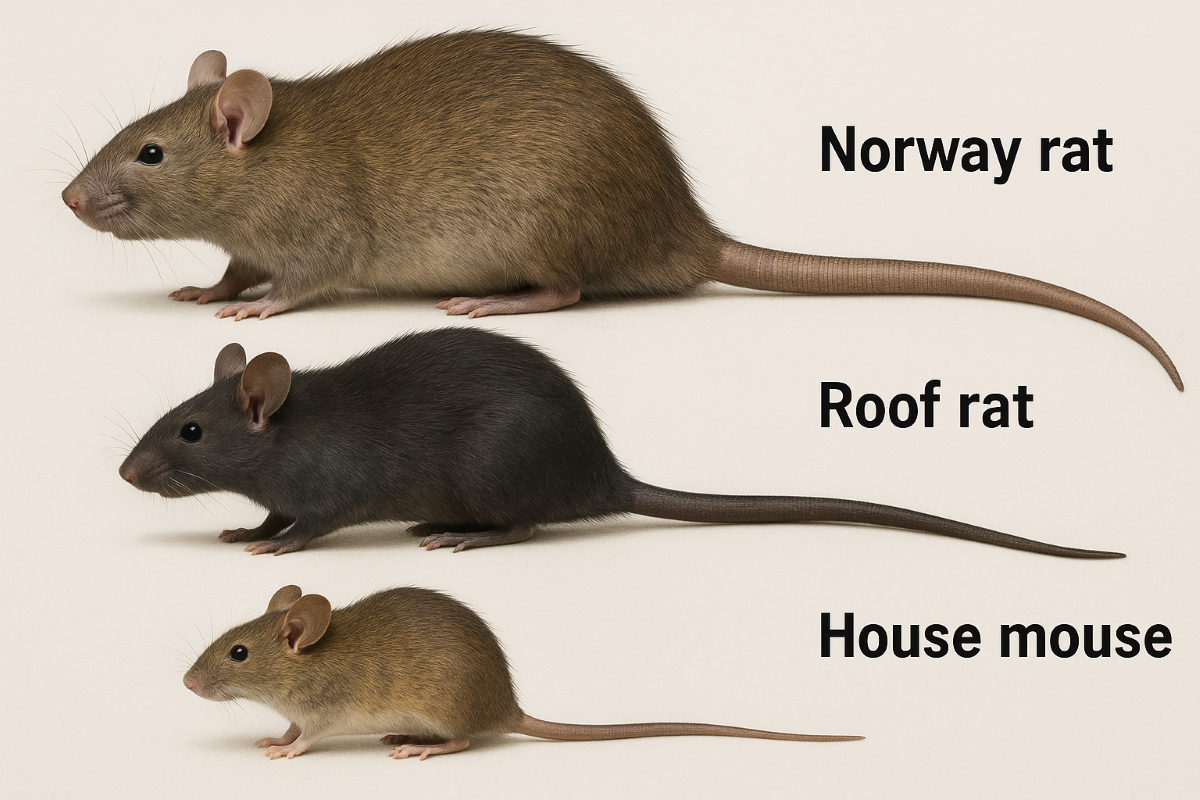Everything You Need to Know About Detecting, Preventing, and Eliminating Rodent Infestations
Are you hearing strange noises at night? Finding mysterious droppings? As a homeowner in Mt. Juliet, you know the importance of protecting your property. One of the most common and potentially damaging threats comes in a small package: rodents.
At Armor Termite and Pest Control, we understand the stress and concern that a potential rodent infestation can cause. That’s why we’ve put together this comprehensive guide to help you identify the signs of rodent activity in your home. Early detection is key to preventing a small problem from turning into a major headache.
Armor Termite and Pest Control is your local expert in rodent removal and prevention — offering fast, safe, and effective solutions to keep your home rodent-free.
What Are the Signs of a Rodent Problem?
Here's What to Look and Listen For:
- Rodent Droppings
| Rodent Type | Appearance | Common Locations |
| Rats | Large, dark, blunted ends | Basements, attics, kitchens |
| Mice | Small, pointed ends, black | Pantry corners, drawers, baseboards |
- Foul Smells
- Ammonia-like urine smell = rodent activity
- Sour or rotting odor = a dead rodent in the wall or ductwork
- Chewed Wires, Walls, and Food Packages
Rodents must gnaw constantly to file down their teeth. This can lead to:
- Exposed electrical wiring (🔥 fire hazard)
- Damaged insulation and wood
- Opened food packaging in pantries
- Nests in Hidden Areas
- Made from: shredded insulation, cloth, paper, leaves
- Look for small, round nests about 5–6 inches in diameter in:
- Attics
- Crawlspaces
- Behind appliances
- Wall voids
- Rodent Tracks & Grease Marks
- Use baby powder or flour near baseboards to expose footprints
- Dark grease smudges on walls show habitual “runways”
- Pet Behavior Changes
- Barking, pawing, or growling at unseen intruders
- Cats focused on certain walls or floors
- Scratching or Scampering Sounds: The Nighttime Symphony of Pests
Listen carefully for noises in your walls, ceilings, and attics, especially at night when rodents are most active.
- Scratching: Faint scratching sounds as they move within walls or across ceilings.
- Scampering: Quick, light scampering noises as they run across surfaces.
Gnawing: Distinctive gnawing or chewing sounds, particularly in quiet areas
Common Rodents in Mt. Juliet, TN

Know Your Local Invaders:
| Rodent | Size | Traits | Nesting Zones |
| Norway Rat | Up to 16″ | Burrows low to the ground | Crawlspaces, foundations |
| Roof Rat | 13–15″ | Excellent climber | Attics, roofs |
| House Mouse | 5–8″ | Small, quick breeder | Cabinets, walls, garages |
🛠️ Mt. Juliet homes, especially those near wooded or agricultural areas, are highly susceptible to seasonal rodent migration. Winter drives them indoors!
DIY Prevention Tips for Homeowners in Mt. Juliet
Top 10 Rodent Prevention Tips:
- Seal cracks around doors, windows, and utility lines.
- Store food in airtight containers.
- Remove clutter from garages and crawlspaces.
- Keep outdoor trash bins tightly sealed.
- Trim back trees or shrubs touching your roof.
- Install door sweeps on all exterior doors.
- Fix leaky pipes (rodents need water sources).
- Don’t leave pet food out overnight.
- Clean behind appliances regularly.
- Have seasonal inspections from a pro.
FAQs about Rodent Infestations
Q1: How quickly can a rodent infestation get out of control?
Rodents, especially mice, breed very rapidly. A small mouse problem can escalate into a large infestation within a few months, with a single female mouse capable of producing 5-10 litters per year, each with 5-6 pups. Early intervention is critical.
Q2: Are there any DIY methods I can try before calling a professional?
A2: While some homeowners try snap traps or bait, these often only address a small portion of the problem. DIY methods rarely eliminate an entire infestation because they don’t address entry points or the core nesting areas. For effective and long-term rodent control, professional intervention is recommended.
Q3: How can I prevent rodents from entering my home in the first place?
- Seal cracks and holes in your foundation, walls, and around pipes and utility lines.
- Install door sweeps on exterior doors and repair damaged screens.
- Store food in airtight containers and keep your kitchen clean.
- Trim vegetation away from your home’s foundation.
- Keep your yard clear of debris, woodpiles, and overgrown bushes that can provide shelter.
Q4: Is it safe for my pets if I have a rodent problem?
A4: Rodents can pose a risk to pets, not just through direct contact and potential disease transmission, but also through the consumption of contaminated food or water. If you suspect an infestation, it’s best to keep pets away from affected areas and consult with a pest control professional about pet-safe treatment options.
Q5: What diseases can rodents transmit to humans
A5: Rodents can transmit various diseases, including Hantavirus Pulmonary Syndrome, Salmonellosis, Leptospirosis, Rat-Bite Fever, and even some types of plague (though rare in modern developed areas). These diseases can be transmitted through direct contact with rodents, their urine, droppings, or saliva, or indirectly through contaminated food or water.

